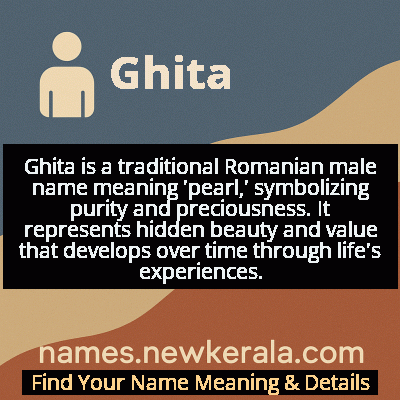Ghita Name Meaning & Details
Origin, Popularity, Numerology Analysis & Name Meaning of Ghita
Discover the origin, meaning, and cultural significance of the name GHITA. Delve into its historical roots and explore the lasting impact it has had on communities and traditions.
Name
Ghita
Gender
Male
Origin
Romanian
Lucky Number
9
Meaning of the Name - Ghita
Ghita is a traditional Romanian male name meaning 'pearl,' symbolizing purity and preciousness. It represents hidden beauty and value that develops over time through life's experiences.
Ghita - Complete Numerology Analysis
Your Numerology Number
Based on Pythagorean Numerology System
Ruling Planet
Mars
Positive Nature
Generous, passionate, energetic, and humanitarian.
Negative Traits
Impulsive, impatient, moody, and can be overly emotional.
Lucky Colours
Red, maroon, scarlet.
Lucky Days
Tuesday.
Lucky Stones
Red coral, garnet.
Harmony Numbers
1, 2, 3, 6.
Best Suited Professions
Military, sports, philanthropy, leadership roles.
What People Like About You
Courage, energy, leadership, generosity.
Famous People Named Ghita
Ghita Mecanic
Folklore Character
Legendary trickster figure in Romanian folklore known for outsmarting authorities
Ghita Popescu
Footballer
Romanian football defender who played for major European clubs and the national team
Ghita Ionescu
Political Scientist
Renowned political theorist and professor specializing in comparative government
Ghita Rădulescu
Engineer
Pioneering Romanian engineer in telecommunications and radio technology
Name Variations & International Equivalents
Click on blue names to explore their detailed meanings. Gray names with will be available soon.
Cultural & Historical Significance
In Romanian folklore, Ghita often appears as a clever, resourceful character who uses wit and intelligence to overcome challenges. The name became particularly prominent during the 19th century National Awakening period, symbolizing Romanian identity and resistance against foreign domination. Traditional celebrations on Saint George's Day (April 23rd) involve various customs and rituals that have kept the name culturally relevant across generations, making it a symbol of spring renewal and protection.
Extended Personality Analysis
Individuals named Ghita are typically perceived as resilient, practical, and grounded people with strong problem-solving abilities. They often exhibit a blend of traditional values and modern adaptability, making them reliable in both personal and professional contexts. Their practical nature is complemented by a subtle creativity that allows them to find innovative solutions to everyday challenges.
Ghitas are known for their loyalty and strong family connections, often serving as pillars of support within their communities. They tend to be determined and persistent when pursuing goals, yet maintain a calm and composed demeanor. Many display a natural leadership quality that emerges in group settings, combined with a good sense of humor that makes them approachable and well-liked. Their combination of traditional wisdom and contemporary thinking makes them effective mediators and trusted advisors.
Modern Usage & Popularity
In contemporary Romania, Ghita remains a recognizable and respected name, though its usage has declined somewhat in favor of more modern names. It is still commonly found in rural areas and among families with strong traditional values. The name maintains its appeal due to its cultural heritage and the continued veneration of Saint George in the Romanian Orthodox Church. While not among the most popular names for newborns today, it continues to be used as both a given name and a nickname for Gheorghe, preserving its cultural significance across generations.
Symbolic & Spiritual Meanings
The name Ghita symbolizes purity, wisdom, and resilience, much like the pearl it represents. It carries connotations of hidden beauty and value that emerges through time and pressure, reflecting the idea that true worth develops through life's challenges. In Romanian cultural context, it also represents protection and courage, drawing from the legend of Saint George slaying the dragon. The name embodies the concept of traditional wisdom combined with practical intelligence, suggesting someone who can navigate both ancient traditions and modern complexities with equal skill.

